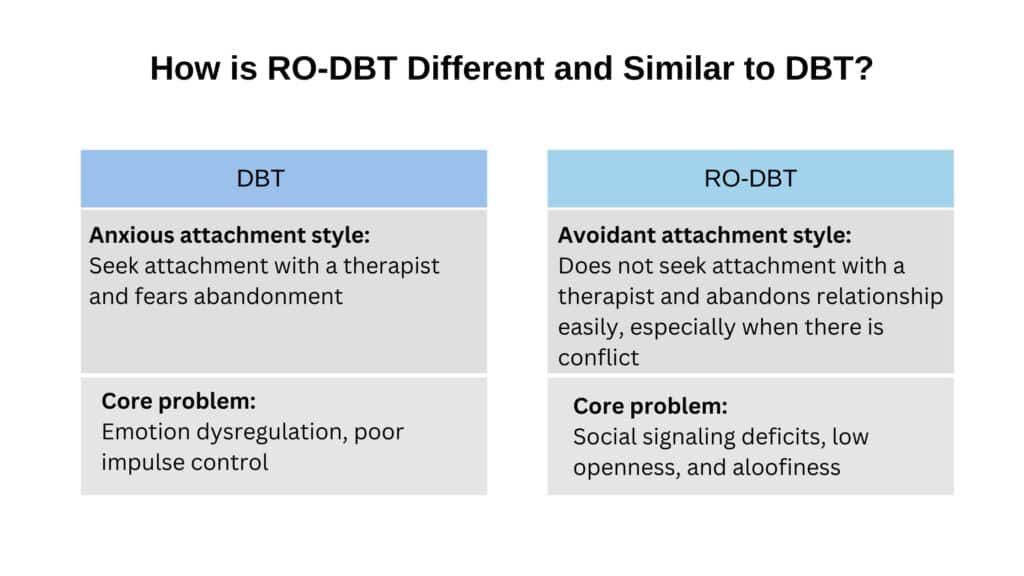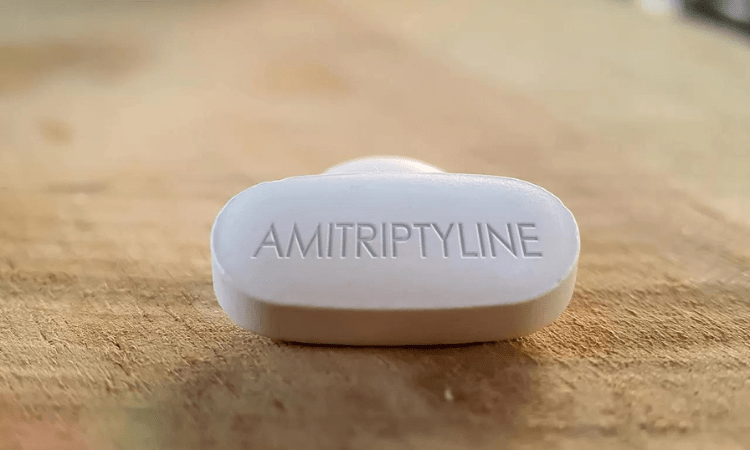Dialectical Behavior Therapy (DBT) and Radically Open Dialectical Behavior Therapy (RO-DBT) stand as two pillars in the realm of mental health treatment, each offering unique perspectives on emotional regulation and interpersonal effectiveness. DBT, renowned for its efficacy in managing a spectrum of disorders, focuses on equipping individuals with tools to navigate intense emotions and develop healthier coping mechanisms.
However, for individuals struggling with pervasive over control tendencies, traditional DBT may not fully address their needs. This is where RO-DBT steps in, designed specifically to target excessive over control and foster greater flexibility and openness in individuals’ behavioral responses.
In this blog, we explore the nuanced differences between DBT and RO-DBT, with a focus on their applications in addiction recovery. Overcontrol takes center stage as we unravel how DBT addresses it through mindfulness, emotion regulation, and interpersonal skills. Similarly, RO-DBT hones in on over control as a primary focus, introducing innovative strategies to promote social connectedness and adaptive response.
Understanding these distinctions is crucial in guiding effective treatment choices for individuals seeking recovery. Join us as we navigate emotional regulation, interpersonal effectiveness, and over control, uncovering the transformative potential of DBT and RO-DBT in the journey toward lasting recovery.

Exploring Core Principles
- Traditional DBT is founded on dialectical philosophy, encouraging the integration of opposing viewpoints to foster balance and harmony within individuals. It aims to empower patients by equipping them with skills to effectively manage emotions, tolerate distress, and navigate interpersonal relationships.
- In contrast, RO-DBT revolves around the concept of “radical openness,” promoting receptivity to new experiences, ideas, and feedback from others. Its primary objective is to cultivate greater emotional and behavioral flexibility while enhancing social connectedness and fostering a sense of belonging.
Key Differentiators
- Mindfulness: Both approaches prioritize mindfulness, but traditional DBT may focus on techniques like mindfulness meditation, while RO-DBT may emphasize mindfulness in social interactions and self-awareness.
- Emotion Regulation: Traditional DBT teaches emotion regulation skills such as identifying and labeling emotions, whereas RO-DBT may emphasize accepting and exploring emotions without judgment.
- Interpersonal Effectiveness: While both approaches address interpersonal skills, traditional DBT may focus on assertiveness and conflict resolution, whereas RO-DBT may emphasize empathy, curiosity, and openness in social interactions.
Overall, while traditional DBT and RO-DBT share common principles, their specific techniques and strategies may vary, allowing therapists to tailor treatment approaches to individual patient needs and preferences.
Navigating the Therapeutic Terrain
1. Multimodal Approach
- Traditional DBT: Utilizing Dedicated Therapy, Skills Practicum Groups, Phone Coaching, and Therapist Consultation Coordination.
- RO-DBT: Utilizes a similar structure with individual therapy and skills training groups.
2. Focus of Individual Therapy
- Traditional DBT: Helps patients apply skills learned in group settings to daily life situations.
- RO-DBT: Tailors sessions to address the specific needs of individuals with excessive self-control.
3. Content of RO-DBT Sessions
- Exercises aimed at increasing openness and flexibility.
- Practice nonjudgmental curiosity and challenge rigid beliefs.
- Engagement in novel or unfamiliar activities to promote behavioral flexibility.
4. Emphasis on Therapeutic Relationship
- Both approaches highlight the importance of therapists modeling effective coping strategies.
- Validation and reinforcement of patients’ efforts to apply learned skills in therapy.
By tailoring treatment strategies to the unique needs of each patient, both traditional DBT and RO-DBT strive to promote lasting behavioral change and emotional well-being.
Delving into the Population Focus of Traditional DBT vs. RO-DBT
Traditional DBT
- Initially formulated for individuals diagnosed with Borderline Personality Disorder. (BPD).
- Adapted for use with various populations, including substance use disorders, eating disorders, and trauma-related disorders.
- Effective for individuals experiencing emotional dysregulation, impulsivity, and interpersonal difficulties.
RO-DBT
- Specifically tailored for individuals with disorders characterized by excessive self-control.
- Target populations include obsessive-compulsive personality disorder, chronic depression, and treatment-resistant anxiety disorders.
- Ideal for individuals exhibiting rigid, restrained, or perfectionistic thinking and behavior patterns.
Both traditional DBT and RO-DBT offer specialized interventions to address the unique needs of their target populations. A comprehensive assessment by a skilled therapist can determine the most suitable treatment approach based on individual symptoms, personality traits, and treatment goals.
Assessing Effectiveness
Traditional DBT
- Extensively researched and proven effective in reducing self-harm behaviors, suicidal ideation, and hospitalizations.
- Improves overall functioning and quality of life for individuals with Borderline Personality Disorder (BPD) and severe emotional dysregulation.
- Skills learned in traditional DBT show long-lasting improvements in emotional and interpersonal functioning.
RO-DBT
- Demonstrated effectiveness in reducing symptoms of depression, anxiety, and excessive self-control.
- Promotes improved social functioning and overall well-being among individuals with disorders characterized by overcontrol.
- Although newer and less researched than traditional DBT, preliminary studies show promising results.
While traditional DBT has a robust evidence base, RO-DBT offers promising outcomes for individuals with overcontrol issues. The choice between the two approaches depends on individual needs and treatment goals, with both providing valuable support for those facing emotional and behavioral challenges. As research on RO-DBT continues to expand, its efficacy and applications are likely to become more established in the field of mental health treatment.
Seeking the Appropriate Help
In navigating the path toward healing, individuals encounter two distinct yet intertwined avenues: Traditional DBT and RO-DBT, both stemming from the framework of dialectical behavior therapy. Traditional DBT zeroes in on aiding those grappling with severe emotional turmoil, while RO-DBT hones in on tackling the challenges of over-control and social isolation.
The determination of whether to embark on the traditional DBT or RO-DBT journey hinges upon a careful consideration of the individual’s distinct needs, symptoms, and therapeutic aspirations. A skilled mental health professional plays a pivotal role in charting this course, drawing from a comprehensive evaluation and understanding of the client’s unique struggles and strengths.
No matter which route is chosen, dialectical behavior therapy furnishes individuals with a treasure trove of tools and strategies to foster emotional and behavioral adaptability, refine relationships, and enrich overall well-being. With the steadfast guidance of a capable therapist and a steadfast commitment to implementing acquired skills, both traditional DBT and RO-DBT hold the promise of profound and enduring transformation.
Considerations for Treatment Providers and Clients
When considering the most suitable approach for addiction recovery, treatment providers and clients alike must carefully weigh various factors to ensure optimal outcomes. This decision involves assessing individual client needs, treatment goals, and available resources. Key considerations include:
- Individual Client Needs: Tailoring treatment to address specific challenges, such as emotional dysregulation or excessive self-control, is essential for effective intervention.
- Treatment Goals: Identifying clear treatment objectives, such as reducing substance use, improving emotional regulation, or enhancing social connectedness, guides the selection of DBT or RO-DBT.
- Available Resources: Evaluating the availability of trained therapists, group therapy options, and support networks can influence treatment decisions and accessibility.
For therapists and treatment providers interested in implementing DBT or RO-DBT, acquiring proper training and certification is paramount. This involves completing specialized training programs and obtaining certification to ensure competence in delivering these therapeutic modalities effectively.
For clients considering DBT or RO-DBT as part of their addiction recovery journey, active participation and commitment to the therapeutic process are crucial. Recommendations include
- Engaging fully in therapy sessions and skills training exercises to maximize the benefits of treatment.
- Practicing newly acquired skills consistently in daily life to reinforce learning and promote lasting behavior change.
- Seeking support from peers, mentors, or support groups to stay motivated and accountable throughout the recovery process.
By carefully considering these factors and recommendations, treatment providers and clients can make informed decisions that support successful outcomes in addiction recovery.
The Bottom Line
When navigating the path of addiction recovery, both treatment providers and clients need to consider individual needs, treatment goals, and available resources. By tailoring
interventions to address specific challenges and objectives, such as emotional dysregulation or substance use reduction, the selection of DBT or RO-DBT can be optimized. Furthermore, acquiring proper training and certification for therapists and actively participating in therapy sessions and skill-building exercises for clients are crucial steps in the recovery journey. With dedication and commitment to the therapeutic process, individuals can maximize the benefits of treatment and achieve lasting behavior change. If you’re ready to embark on your journey towards recovery, don’t hesitate to take the first step. Reach out to Relevance Recovery today and begin your path to healing.









